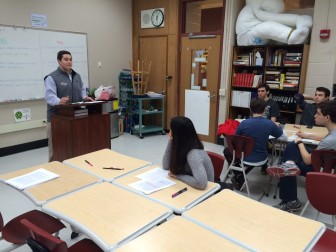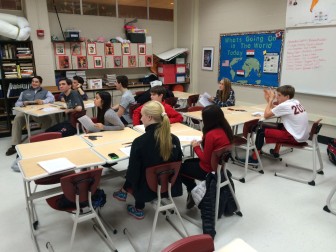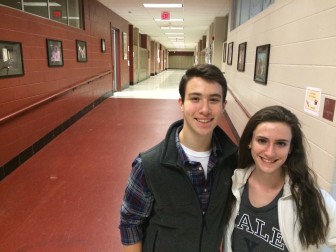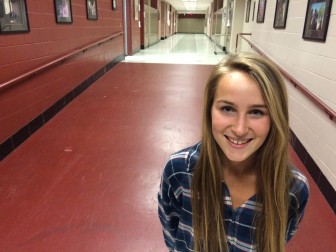New Canaan High School senior Matt DeMattia strode to the podium at the front of Room 105 after school on a recent afternoon, his fellow Debate Team members—a group that represents all four grades and numbers about 45, up from a half-dozen less than a decade ago—waiting during this practice to hear him argue in favor of this statement: “College athletes should be paid competitive salaries.”

NCHS senior Matt DeMattia during Jan. 9 Debate Team practice. Credit: Michael Dinan
A New Canaan Rams varsity football player recently restored to the Debate Team from the gridiron (and a state title), DeMattia argued that “the American economy is built on one thing, and that is capitalism—and capitalism isn’t necessarily fair, it isn’t necessarily even, but it’s built around the fact that those who generate income get to keep that income.”
“Big football schools earn $40 million to $80 million for a single season, such as Florida or Penn State. These football players are playing for their schools and generating massive amounts of wealth for their programs and for the NCAA, and they are receiving absolutely none of this wealth. They are generating this income and by the fundamental beliefs of capitalism, they should earn this income.”
It’s a cogent, reasoned argument that the teen delivered with confidence and facts—qualities, according to Debate Team coach Kristine Goldhawk, that DeMattia has developed over three years with the group.

Some members of the New Canaan High School Debate Team practice after school on Jan. 9, 2015. Credit: Michael Dinan
“When he started, he was very brash and not very organized and not really logical in terms of his thought process, so he tended to ramble all over the place,” recalled Goldhawk, a NCHS teacher whose classes include World History, Civics and AP Comparative Government and Politics. “Over the course of the years, he has really tightened up his argument style. He still has that swagger but it is deserved now. He owns it and when he gives his arguments, and when he’s under cross-examination by an opposing team, he has the knowledge and speaking ability to back up the brashness.”
The transformation is typical of students competing with an academic team that’s seen steady success since its revival about eight years ago.

Steven Singer and Casey Manzella are senior co-captains of the New Canaan High School debate team. Credit: Michael Dinan
A Connecticut Debate Association member team that practices through the entire academic year, Debate is an increasingly popular extracurricular whose participating students say it offers challenge, camaraderie, competition and a rare opportunity to refine communications skills for college and the working world.
And far more.
“The part that is probably my favorite is that at every debate we debate both sides of the argument,” said Casey Manzella, a Yale-bound senior who serves as co-captain of the team along with senior Steven Singer.
“A lot of people think debate is just choosing your side and sticking to that side, and not giving in to what other people say and not hearing what other people say. But having to debate both sides forces you to consider the issue from both points of view, and that’s something that I think helps you in your daily lives, whether that’s in negotiations with other people or negotiations at work years from now. It just makes you more open-minded.”

Freshman Eliza Farley took up Debate Team as an extra-curricular at NCHS, connected with the program immediately and says she intends to stick with it. Credit: Michael Dinan
Starting with a “boot camp” before the academic year commences, the team practices once a week for one hour after school throughout the year, with a 2-hour practice scheduled before monthly tournaments.
At the tournaments, divided into novice and intense varsity competitions, students pair up and participate in three “extemporaneous” debates—that is, they receive a packet of information on the spot, including a “contention” which they’ll spend three rounds affirming or arguing against, with a fourth round if they do well. The rounds set aside time for competitors to form and present arguments and then undergo cross-examination, with a judge scoring them on each section.
New Canaan High School’s team competes in about a dozen tournaments each year, Goldhawk said, including Connecticut Debate Association and one-off tourneys, going up against kids from New York, New Jersey and Pennsylvania and even Montreal and California.
“As we have gotten more competitive, we have widened our scope of the teams we compete against,” she said.
The team includes athletes, theater kids, regular-level students, AP students and special ed students—many of whom “join the team because they’re actually afraid of talking and this is a good way to get over that fear,” Goldhawk said.
They’ve accomplished that and more, she said, notching top-3 finishes at states the past three years (see tournament results here).
The biggest change that Goldhawk sees in students from the time they start as Debate Team underclassmen and finish as seniors?
“Confidence,” she said. “When they leave me ,they have become more confident and better public speakers, more willing to meet adults and look them in the eye. They also improve their writing because of the ex-temp style debate. They have to come up with three contentions or arguments and write a persuasive essay, so we see improvement in writing scores a lot of times.”
There are social benefits, too—not that these students are waiting around for something to do.
Freshman Eliza Farley volunteers with younger kids at the Congregational Church in town, belongs to Model UN and Latin Club, and plays three sports—soccer in the fall, indoor track in the winter and, soon enough, outdoor track in the spring.
Partnering up with her friend Lauren Capone, Farley said part of what she likes about debate is that it offers a chance to mix with students in different years at the high school.
“That is part of it, because with sports, most freshmen are stuck on a freshmen team, so this is sort of na opportunity to get to know kids that are upperclassmen, and so it lets us know what other parts of the high school are like and what to expect in the future,” Farley said.
She looked at several extracurriculars and signed up for Debate, in part, because it takes academics and current affairs and “formats them in a way that’s easy to understand and pick up on, but it also has the competitive edge that sports do.”
“And it sort of brings you and partner closer together and really just tests your brain,” she said.
Similar features of Debate Team drew Singer to the program as a freshman, he recalled.
“They give you huge packet at the end of eighth grade with all the clubs, and I figured I would leaf through and as soon as I saw the Debate Team, I had seen movie ‘The Great Debaters’ and I was interested in topic—also my parents said I was too loud—and I figured I would give it a shot,” he recalled.
Nervous in his first novice tournament as a freshman, Singer befriended a senior on the team who encouraged him.
The connection that kept him coming back was the challenge of debating, Singer said.
“There is never a debate that I walk into where I don’t feel challenged or I don’t feel like I have to be on my toes,” he said.
It’s served Singer well academically, especially in the social sciences and in English at the high school where analytical thinking skills are required, he said.
“We have to look at both sides, not only debate both sides but anticipate others’ arguments,” he said. “It certainly adds another level to my analysis when I’m reading a document or book or starting to write an essay.”
That said, and though participation in Debate Team also has helped Singer develop his own point of view, the co-captain said perhaps the most important takeaway from the experience has been “how I am actually viewing people in social interactions.”
“That is where debate has helped me the most,” Singer said. “I see where people are coming from in a clearer, better way.”